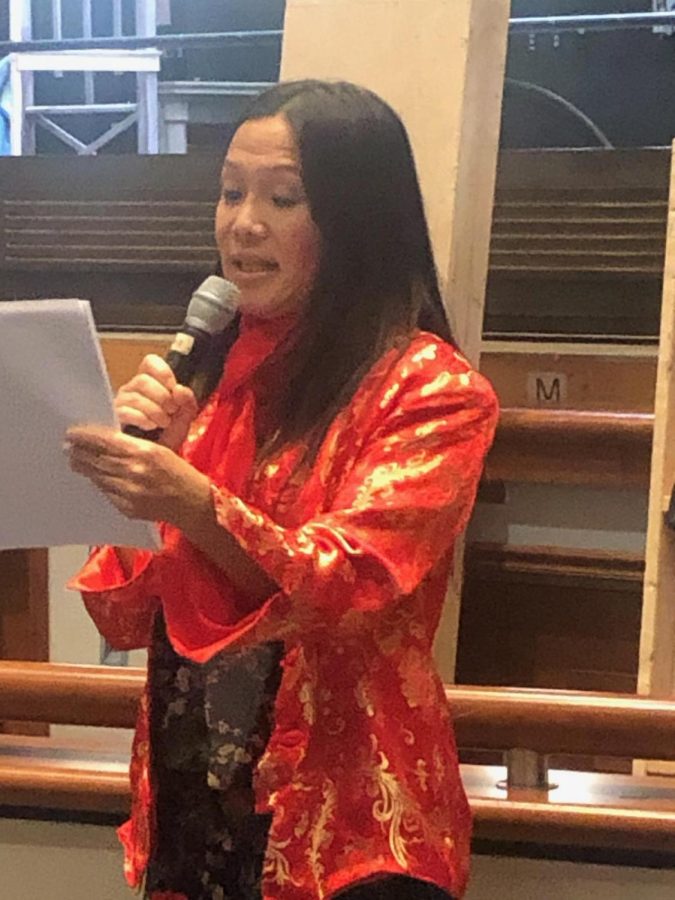She’s Got the Eye of the Tiger
Laoshi Leads Chinese New Year Celebrations
Above, Laoshi Cohen answers students’ questions about the Chinese New Year during an Upper School assembly in Benjamin Hall on Feb. 4. Below, a dragon bowl crafted by sophomore Taylor Grande as part of first semester ceramics class with Ms. Duran.
February 11, 2022
The Chinese New Year, also known as the Spring Festival, is the time to celebrate Chinese culture. Celebrated on the Chinese calendar, the Chinese New Year is filled with spirited traditions and reasons to celebrate.
The origin of the Chinese New Year evolved throughout the Shang and Han dynasties, but the story of how it started is based on a legend.
One of the most popular is about the mythical beast Nian, who ate livestock, crops, and even people on the eve of a new year. To prevent Nian from attacking people and causing destruction, people put food at their doors for Nian.
It’s said that a wise old man figured out that Nian was scared of loud noises (firecrackers) and the color red. Then, people put red lanterns and red scrolls on their windows and doors to stop Nian from coming inside, and crackled bamboo (later replaced by firecrackers) to scare Nian away. The monster Nian never showed up again.
The time of the Chinese New Year varies; the Chinese calendar is lunisolar, which means it shows elements of both the lunar and solar calendars. The Chinese use the Gregorian calendar to live their daily lives while using the Chinese lunar calendar to observe their traditional festivals and conduct their folk activities. Based on the moon’s revolution around the Earth, it is about 11 days shorter each year than the solar calendar. To synchronize with the time the Earth needs to rotate around the sun, the Chinese ancestors added a leap month to their calendar every two or three years.
The lunar month contains the winter solstice as the eleventh month, which means that Chinese New Year usually falls on the second new moon after the winter solstice. This year signifies the year of the Tiger in zodiac signs. The Tiger is significant because these people have a hard work ethic; it also signifies that this new year will be forward moving.
The cycle repeats every 12 years with 12 different animals each year and their reputed attributes. The order of the Chinese zodiac or “Shengxiao” is Rat, Ox, Tiger, Rabbit, Dragon, Snake, Horse, Goat, Monkey, Rooster, Dog, and Pig.
Celebrations to usher out the old year and bring forth the luck and prosperity of the new one, therefore, often include firecrackers, fireworks, and red clothes and decorations. Young people are given money in colourful red envelopes. In addition, Chinese New Year is a time to feast and to visit family members. Many traditions of the season honour relatives who have died.
Among other Chinese New Year traditions is the thorough cleaning of one’s home to rid the resident of any lingering bad luck. Some people prepare and enjoy special foods on certain days during the celebrations. The last event held during the Chinese New Year is called the Lantern Festival, during which people hang glowing lanterns in temples or carry them during a nighttime parade. Since the dragon is a Chinese symbol of good
fortune, a dragon dance highlights festival celebrations in many areas. This procession involves a long, colourful dragon being carried through the streets by numerous dancers.
Senior Caroline Yancey is the president of Chinese club and organized a meeting during which members of the club made dragons to celebrate the new year.
Normally, senior Will Zhang celebrates the New Year by gathering with his family, sharing joy, and reflecting on the previous year. Due to COVID-19, Zhang is unable to go on a family vacation, but will celebrate by enjoying hot pot, a traditional Chinese dish.
“Hot pot is special in the Chinese New Year because it means ‘all in one’ which symbolizes family reunion,” Zhang explains.
Zhang, born in 2004, has the zodiac of a monkey. “I feel connected to it because I am very active physically and psychologically,” Zhang says.
Furthermore, Mandarin Chinese teacher Ms. Lei Deng Cohen also celebrates the Chinese New Year. Normally she would celebrate with her friends, but this year due to COVID-19, she is unable to properly celebrate. Her favorite part about the Chinese New Year is the food. Whole fish is a staple for new year celebrations in China and the fish symbolize prosperity for the next year.
The Chinese New Year is a celebration of life and culture that also honors gods, ancestors, and good fortune for years to come.



